Fall 2022 newsletter
Dee Dungy, Kenya
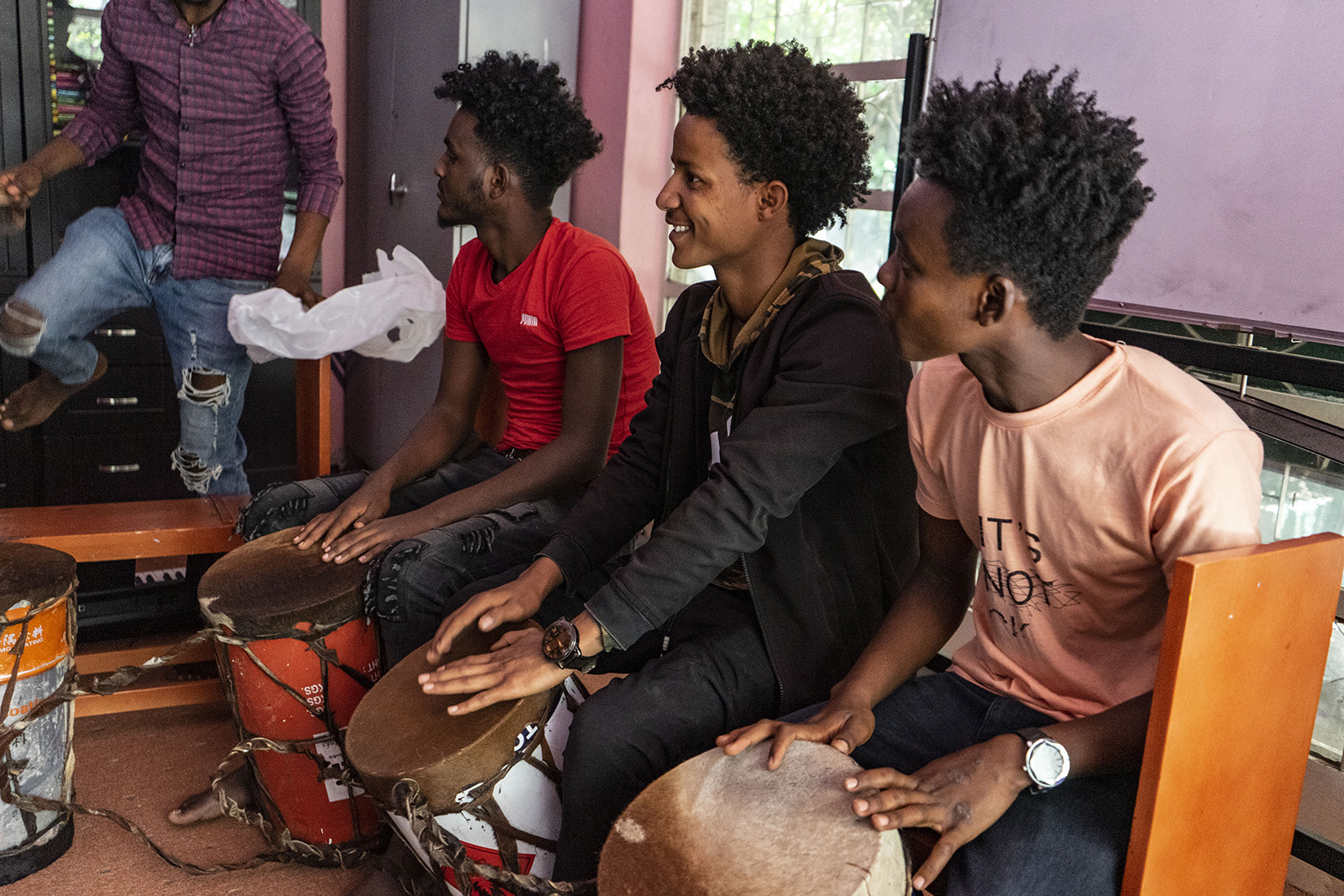
All photos show participants in music therapy classes at JRS Child Protection Centre in Addis Ababa and at the Dollo Ado refugee camps in Ethiopia (courtesy of JRS).
I recently read that the black-faced impala is significantly larger in the antelope family, and is the most vulnerable of the species (fewer than 1,000 were estimated in the wild) compared to the common species. Impalas are known to jump close to 10 feet, over vegetation, or simply jump over anything in their path covering distances up to 33 feet.
This remarkable ability is undoubtedly crucial to its survival in the African wilderness. Yet, while held in captivity in zoos or farms, the impalas will not jump over a 3-foot wall. What keeps them in place is that they will never jump unless they can see where they will land.
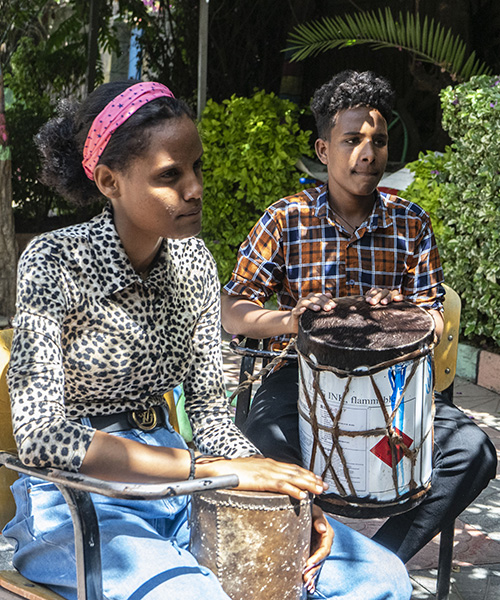 Not knowing what our next steps may be in times of turmoil is frightening, confusing and keeps many of us in place. Without ever being elected, the president of Eritrea has been in office for 30 years. Because of the ongoing conflict in his nation, hundreds of young people have been forced to leave and live abroad.
Not knowing what our next steps may be in times of turmoil is frightening, confusing and keeps many of us in place. Without ever being elected, the president of Eritrea has been in office for 30 years. Because of the ongoing conflict in his nation, hundreds of young people have been forced to leave and live abroad.
There was much optimism for peace in the Horn of Africa when Ethiopia and Eritrea reached a peace agreement in 2000 that reopened the border between the two countries previously engaged in war over territorial, economic and political disputes.
But conflict continued to brew in Ethiopia’s northern state of Tigray between Tigrayan regional forces and the Ethiopian government. That conflict has made youth and young adults and other vulnerable groups targets for economic and social abuse and exploitation.
In June 2022, the UN special rapporteur on human rights in Eritrea, Mohamed Abdelsalam Babiker, issued a report critical of the deteriorating human rights situation in the country. The UN interviewed more than 500 confidential witnesses about the nation in the Horn of Africa, hearing accounts of sexual slavery, extrajudicial killings, and forced labor.
Human Rights Watch previously reported in August 2019 that the Eritrean education system had become a conscription machine that subjects students into indefinite, compulsory military or government jobs. According to the report, “During their prolonged conscription, they risk systematic abuse, including torture, harsh working conditions and pay insufficient to support a family.” Many flee from the country because of this.
 In speaking with the young unaccompanied women who have made the journey, I understand and hold closely their perseverance, resilience and determination to survive. These injustices, coupled with tenuous political situations, are causing mass migrations of people who do not know where they may land.
In speaking with the young unaccompanied women who have made the journey, I understand and hold closely their perseverance, resilience and determination to survive. These injustices, coupled with tenuous political situations, are causing mass migrations of people who do not know where they may land.
As they flee, with their emotional fragility and uncertainty in tow, the unspoken therapeutic beat of the rising sun to the setting moon masks the young people’s fear and anxiety as they journey the three- to four-day trek from Eritrea to Ethiopia or Sudan to the different refugee camps.
There they find new life and encouragement at Jesuit Refugee Service’s art and music therapy classes. The classes provide an upbeat to their downbeat challenges. They foster pathways for the youth and young adults to cope with their traumas and experiences with meaningful resolve to strengthen their resilience.
Not knowing what our next steps may be in times of turmoil is frightening. But for the unaccompanied youth and young adults escaping Eritrea, over time, peace becomes real through the music — a stark contrast to the bombings, gun fire, hunger, and exploitation they have fled. Through the music, they discover a balance, which contributes to their healing and restored dignity.
I invite you to watch this JRS video, showing the healing effect of the music therapy classes in a refugee camp in Addis Ababa, Ethiopia.
Please consider making a special gift to Maryknoll Lay Missioners’ “Walk With Us” campaign, which raises money for the recruitment, training and ongoing support of all of us lay missioners. We can only “walk with” the people here because you are “walking with” us. Thanks to matching gifts, every $100 given to the campaign in effect becomes $150. To donate ONLINE, click the “Walk With Us” button below. Thank you so much for your generosity!


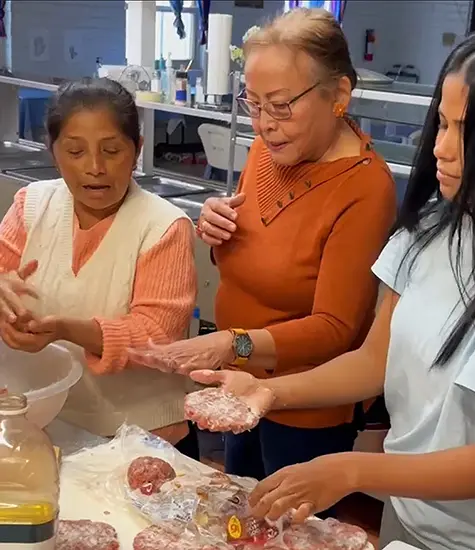
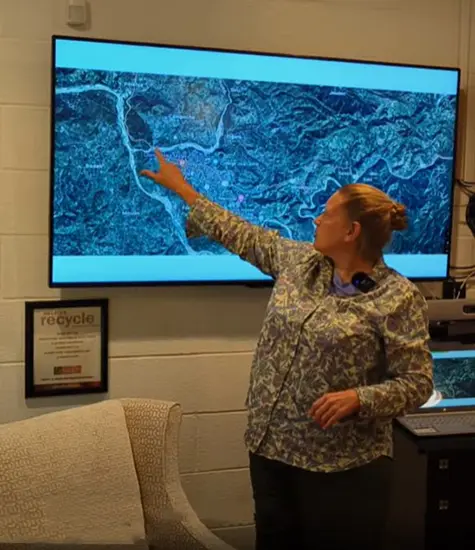
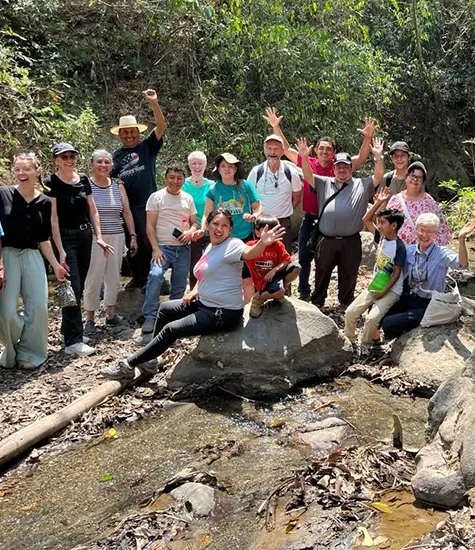




Thank you for sharing this story Dee. Such great work.
Thanks a lot, Dee. My heart melted while reading this story. Yes, music is a big help. I am happy for you, Dee and praying for your perseverance. Stay well.
Thank you. Peace.